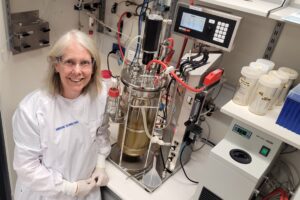Assessing the probiotic potential of alternative hydrogen-utilising bacteria
 Wouldn’t it be great if you could boost your cattle’s health and growth while reducing their methane emissions?
Wouldn’t it be great if you could boost your cattle’s health and growth while reducing their methane emissions?
Queensland’s Department of Agriculture and Fisheries (DAF) is working on it!
When we use dietary additives that reduce methane emissions from cattle, more hydrogen is released into their rumen.
As part of the Greener Cattle Initiative, DAF and its partners are researching how certain bacteria can help turn this hydrogen into beneficial energy products. This could lead to development of probiotics that boost cattle health and growth.
Initially the team will study a variety of bacteria that use hydrogen. They will add these into a fermenter that mimics the conditions of the rumen to measure their effect on methane production and evaluate their competitiveness. The bacteria will also be tested in conjunction with methane-suppressing compounds.
The top bacterial candidates will be developed into in-feed probiotics that improve energy capture by redirecting excess hydrogen in the rumen to more productive end-products—particularly in cattle receiving methane-blocking feed additives.
This will help achieve sustainable decreases in methane emissions while boosting animal performance and health, improving agricultural sustainability.
Part of the Foundation for Food & Agriculture Research’s Greener Cattle Initiative, the $US3.2 million project is led by the University of Illinois and involves seven international research hubs in the United States, Canada, Australia, New Zealand, England, Israel and Norway.
The Australian research hub is a collaboration between DAF, agriculture biotech company ProAgni and the University of California Davis.